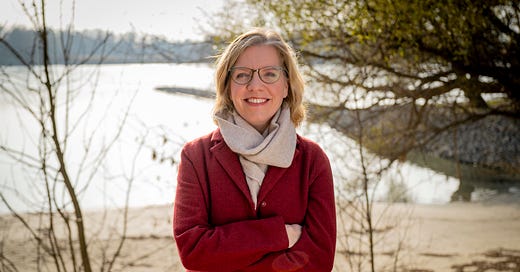Comfort Blanket
Former environment minister Leonore Gewessler looks set to be crowned the Greens' next leader, avoiding an open debate over the party's future
Servus!
In January 2020, the Greens stepped out of the oppositional role they had held at the federal level for almost 40 years, becoming the junior partner what was, at the time, Sebastian Kurz’s conservative People’s Party (ÖVP). One month later, the first COVID-19 cases were confirmed in Austria, setting the tone for the Greens’ baptism of fire as they governed through a series of international crises that hit Austria hard: a global pandemic, an international supply side crisis, a second wave of irregular migration into Europe, Russia’s invasion of Ukraine, and Europe’s twin energy and inflationary crises.
58 percent of voters believing Austria was heading in the wrong direction, like other governing parties in Europe, the Greens were punished in last year’s elections in part for having been the ones holding power at the wrong moment. Having won 13.9 percent of the vote in September 2019, five years later, the Greens’ vote share was reduced to just 8.2 percent. Between 2019 and 2024, the Greens lost some 148,000 voters to the center-left Social Democratic Party (SPÖ), as well as 57,000 to the liberal NEOS and 55,000 to the ÖVP. Another 45,000 simply stayed home.
This analysis, mind, is not to absolve the Greens of responsibility for their own drubbing. Too often the ÖVP-Green coalition resembled, rather than a partnership of equals, a marriage in which the senior partner ran roughshod over the junior. For five years, the Greens went along with a conservative tax-and-spend agenda that cut income taxes and enlarged loopholes just as Austria was increasing spending due to the aforementioned crises. The Greens even managed undercut their own achievements; the Klimabonus negated the nudge effect the Greens’ longed-for tax on CO2 should or could have had.
The ÖVP-SPÖ-NEOS coalition having been sworn on March 3, the Greens have now returned to their old oppositional role in parliament. Indeed, outside of Burgenland—where the Greens are the junior partner to Hans Peter Doskozil’s SPÖ—opposition is now the Greens’ default position nationwide. The coming citywide elections in Vienna offers the possibility of a return to power in the capital, though their voteshare is projected to decrease by three percentage points and mayor Michael Ludwig (SPÖ) is more inclined to turn to the ÖVP or NEOS in search of a coalition partner than the difficult Greens.
The next five years, then, should be ones of introspection as it seeks to navigate an odd role as both a partner to the new ÖVP-SPÖ-NEOS government in passing constitutional legislation and an opponent of that very same coalition. That soul-searching begins with finding a new leader, former vice chancellor Werner Kogler having previously announced he intended to pass the mantle. A leadership contest could have offered the Greens a chance to openly debate the kind of party they wish to become. Unfortunately, the Greens are instead sleepwalking towards a coronation of the former environment minister, party darling Leonore Gewessler.
Gewessler was a combative and somewhat competent minister whose achievements include the Klimaticket, the subsidized annual pass for Austria’s public transport network. By the end of her time at the super-ministry for climate protection, energy, transport, innovation, and technology, Gewessler was also about as popular with the electorate as cholera, with an approval rating of -26. Between 2019 and 2024, the Greens retained a core of 284,000 voters, and Gewessler appeals to precisely those people: the party faithful of younger, urban-dwelling, college educated women who believe in the party’s environmentalist principles. Nothing about Gewessler’s career to date suggests she has the capacity to reach out beyond that core, and in crowning her over holding an open contest involving Stefan Kaineder and/or former justice minister Alma Zadić, the Greens have opted for the cozy, comforting path of least resistance, a decision that may do the party a great disservice in the end.
Bis bald!
Thank you for reading The Vienna Briefing. Nothing beats a personal recommendation; if you know someone who would be interested in reading this newsletter, consider sharing it with them today.
The Vienna Briefing is a reader-supported publication. Your one-time or monthly tips make my work on this newsletter possible and help keep The Vienna Briefing free for everyone.
U.S.-EU Tariff Chaos
Austrian exports to the United States will be subject to a 10 percent baseline tariff imposed on the European Union, though the Trump administration walked back an earlier threat to slap raise rates to 20 percent. In 2024, the U.S. was Austria’s second-largest export partner, in particular for machinery and vehicles as well as chemical products.
More Savings Needed
€6.3 billion in savings in 2025 and an additional €2.4 billion in 2026 will be insufficient when it comes to bringing Austria’s budget deficit back down below 3 percent of GDP, according to a new report from the country’s Fiscal Advisory Council. The new government may now have to find as much as €12.7 billion in savings in 2025.
ÖVP Leads On Election Spending
The ÖVP spent €7.9 million fighting the 2024 legislative election campaign, just below the €8.66 million limit allowed under Austrian electoral law. Of the €500,000 spent by the Beer Party, more than half went towards personnel costs, while only €3,000 went towards billboards and posters.




